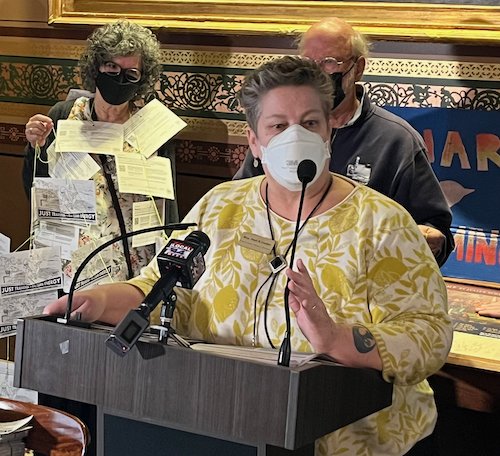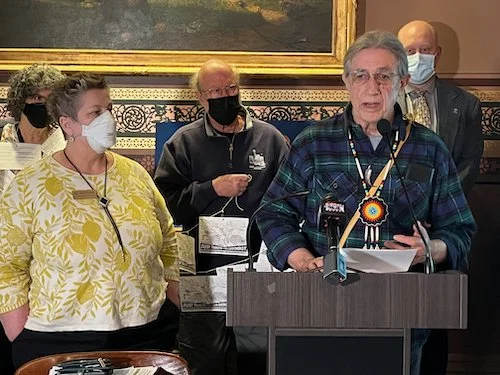Together we can do this work: Vermonters support legislators in their bid for bold climate action
by 350VT Member, Roger White
On Thursday, March 2, 350VT volunteers delivered over 1,700 postcards to legislators in Montpelier, signed by Vermonters all across the state, asking for bold and effective climate action.
To mark the occasion, volunteer Marisa Keller delivered a statement of 350VT’s priorities for this legislative session, highlighting seven climate solutions that are within reach. (Read the full statement here). She was followed by five dynamic speakers who expressed a range of outlooks on climate change, climate justice, and the work we need to do to move forward.
Rep. Mari Cordes speaking at the 350Vermont Press Conference on 3/2/2023
Two Vermont legislators joined the press conference to talk about current climate legislation. Rep. Mari Cordes (Addison-4) discussed her networked-geothermal bill (H.242), and reflected on the stark contrast between geothermal energy and some of the problematic alternatives proposed in other climate legislation. “Burning biofuels is not clean. Geothermal is,” she said. Cordes championed thermal networks—where housing complexes, business districts, and even entire towns can be heated and cooled using one safe and efficient system—as models of “communities and stakeholders [coming] together to solve problems.”
Cordes also discussed the importance of ratepayer protection for low-income families in Vermont, some of whom pay as much as 50% of their disposable income on energy costs: “Geothermal would address that, and so would ratepayer protection using a tiered approach.”
Rep. Caleb Elder (Addison-4) described the changes to Vermont’s Renewable Energy Standard proposed in his reform bill, H.320: to make sure that the standard brings new renewables online, lends more support to community energy projects, and phases out the use of “unbundled” renewable energy credits from the large-scale hydropower producer, Hydro-Québec.
Rep. Caleb Elder speaking at the 350Vermont Press Conference on 3/2/2023
“Now, we have the incorrect sense that we’ve done all we need to do with renewables,” he said, calling his bill “a path forward from the problematic status quo.” Remarking on the economics of renewable energy in Vermont, Elder noted that “moving towards renewables is not revenue loss for the utilities. Actually this transition amounts to revenue gain… This is economic development that’s critical to our state.”
Elder closed with a statement of encouragement for anyone working towards climate justice in the state: “We can do this work, and anyone who says we’re too small to make a difference does not understand the history of the state of Vermont.”
Grace Palmer, an Environmental Studies Major at St. Michael’s College, spoke about the need for concerted effort to meet the demands of the climate crisis. Many of her generation, she said, feel despair about the magnitude of the task—but not all of them. “It’s inspiring to see so many young people who want to act, who are energized, even if it’s from fear, to tackle the problems that lie ahead,” she said.
Palmer called on the Vermont legislature and Gov. Phil Scott to join these young people in taking action: “It shouldn’t and it cannot be up to us alone…. It is only when we stand united, through the generations, that we have a chance at mitigating the climate crisis and protecting the future generations who will also call this planet their home.”
A member of Families Rise Up and a mother of two young children, Nikki Jiraff, echoed the theme of intergenerational unity. She recalled her own experience of learning about climate change when she was in second grade, and feeling “completely perplexed” about why the grown-ups weren’t doing anything about it.
“I don’t want my son and daughter to feel afraid and alone like I did, when I was a little girl,” Jiraff said. She envisions a future in which we can look back on this time with a sense of pride in our accomplishments—to say, in her words, “We didn’t give up. We researched, we trusted science, and even though it wasn’t easy and we had to make sacrifices, we chose what was right.” She called on her legislators to act in making this a reality: “As leaders, you have the power to do what’s right. As I say to my kids, ‘Show me that you can do it.’ ”
Earl Hatley speaking at the 350Vermont Press Conference on 3/2/2023
Earl Hatley focused his remarks on the importance of energy conservation in the transition to an equitable clean energy future. Co-chair of the Western Mining Action Network and Chair of its Indigenous Caucus, Hatley described the inordinate impact of renewables-industry mining on indigenous lands and peoples.
As ways to reduce these impacts and curb energy use, Hatley cited pedestrian and bike-friendly town plans, accessible urban and rural mass transit, weatherization, and the recycling of materials used in renewables. That will, he said, create “a more just transition for indigenous peoples, workers and our communities.” Hatley concluded with a call for “courageous politicians to stop the carbon trade and build low carbon power for Vermont. We need to ensure a just transition to low carbon electricity solutions for all Vermonters.”




